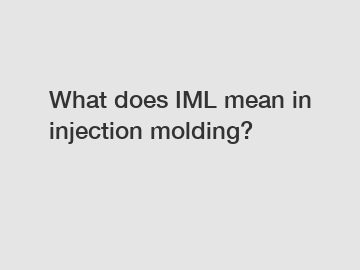What does IML mean in injection molding?
Injection molding is a widely used manufacturing process in which molten material is injected into a mold cavity to produce a desired part or product. In-mold labeling (IML) is a technique that has revolutionized the injection molding industry by allowing for the incorporation of labels or graphics directly into the molded part.
IML involves placing a pre-printed label or graphic into the mold cavity before the material is injected. The molten material then bonds with the label during the molding process, creating a seamless and durable finish that is resistant to wear and tear. This technique eliminates the need for secondary labeling processes, such as adhesive labels or pad printing, saving time and reducing production costs.
The benefits of IML go beyond just cost savings. The labels or graphics applied through this process are highly customizable, allowing for the incorporation of intricate designs, vibrant colors, and high-definition images. This level of customization is especially beneficial for industries that require branding or labeling on their products, such as the packaging, automotive, and consumer goods industries.

Moreover, the in-mold labeling process is environmentally friendly, as it eliminates the need for additional adhesives or solvents that can be harmful to the environment. The labels used in IML are typically made from recyclable materials, making them a sustainable choice for manufacturers looking to reduce their carbon footprint.
In addition to its aesthetic and environmental benefits, IML also offers practical advantages in terms of functionality. The labels applied through this process are resistant to scratches, moisture, and UV exposure, ensuring that the graphics remain vibrant and legible throughout the product's lifespan. This durability is especially important for products that are subjected to harsh environmental conditions or frequent handling.
IML is a versatile technique that can be applied to a wide range of materials, including plastics, rubber, and composites. This flexibility allows manufacturers to use in-mold labeling for various applications, from food packaging to automotive interiors. The ability to incorporate labels directly into the molded part also provides a seamless and professional finish that enhances the overall look and feel of the product.
Despite its many benefits, in-mold labeling does require specialized equipment and expertise to execute successfully. Manufacturers must use precision molds and injection molding machines that are specifically designed for IML to ensure a high-quality finish. Additionally, the labels used in this process must be compatible with the material being molded and capable of withstanding the high temperatures and pressures of the molding process.
In conclusion, in-mold labeling is a game-changer in the injection molding industry, offering a cost-effective, customizable, and environmentally friendly solution for incorporating labels and graphics into molded parts. The benefits of IML extend beyond just aesthetics, providing manufacturers with practical advantages in terms of durability and functionality. While IML does require specialized equipment and expertise, the investment is well worth it for the superior finish and performance that this technique offers. Whether you're producing consumer goods, automotive components, or packaging materials, in-mold labeling is a versatile and effective solution for enhancing your products and brand.
Are you interested in learning more about yogurt cup manufacturers, 100g yogurt to cups, margarine container? Contact us today to secure an expert consultation!



